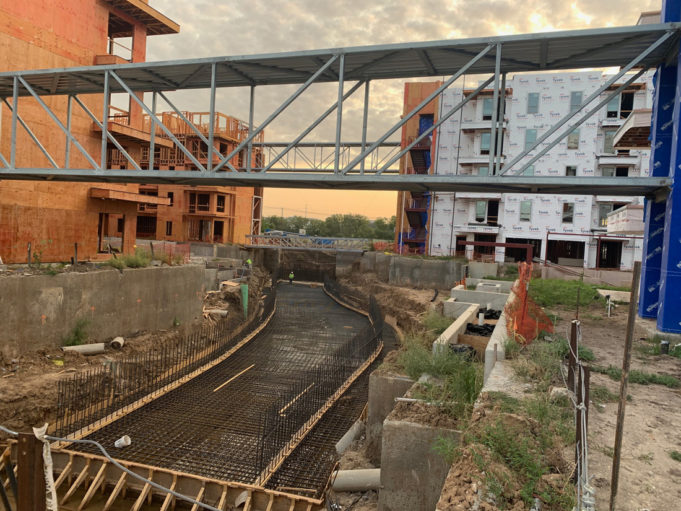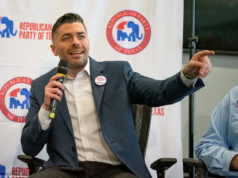Ask any number of Tarrant County folks what the Tarrant Regional Water District (TRWD) does, and you’ll see at least a few quizzical faces. The TRWD is tasked with providing safe and reliable drinking water to the 2 million residents of Tarrant County and 10 nearby counties. Providing reliable water requires more than servicing pipes, so TRWD engineers and work crews continually maintain aquifers and build new pipelines to ensure that every time one of its customer’s faucets is turned on, potable water from one of the forks of the Trinity River effortlessly pours out.
Were the TRWD’s projects only faucet-related, the governmental group and its roughly $150 million annual budget would probably garner far fewer pages in, and attention from, the Weekly and other publications. It’s TRWD’s other responsibility, flood control, that has placed the water district’s five-member board in charge of a flood control/development project that promises to transform part of Fort Worth’s North Side into a massive waterside development. Panther Island may one day cater to locals and tourists alike. Fort Worth stands to gain considerably from the development — if TRWD manages to work through significant losses of funding. Congress has authorized but not prioritized $526 million in federal funds for the project, although Panther Island communications director Matt Oliver said federal funds have by no means dried up.
In August, when the TRWD board proposed significant changes to its general ordinance (which regulates land and water under TRWD’s control) and commercial facilities ordinance (which sets guidelines and standards for facilities on TRWD property), many took notice. After TRWD officials met with Fort Worth City Council in late August and heard mostly reservations and concerns, TRWD directors decided to delay their mid-September vote until at least November 30. City officials wanted more time to mull over the potential impact of the changes, which expand powers to TWRD’s general manager James Oliver, and TRWD staff realized that public awareness over the proposal wasn’t where it needed to be.
David Cooke, Fort Worth city manager, said in a memo to city councilmembers that “the revised ordinances would greatly expand the authority of the district to regulate development in Fort Worth and surrounding cities and counties.”
The proposed revisions, if passed in their current form, will give Oliver expanded flexibility to revise existing ordinances.
One new addition says, “The general manager of the district may, from time to time, adopt or amend any rules, codes, policies, or other standards governing” the construction or maintenance of properties or facilities located on or under TRWD land or water. The water board has long been dogged with accusations that the Panther Island project is unnecessary (“ Unleashing a Flood of Questions,” June 2011) and a poor use of public spending (“Troubled Waters,” Dec. 2006).
So are the ordinance changes a power grab meant to open the floodgates (metaphorically speaking) on Panther Island expansion?
“Not at all,” said Dan Buhman, TRWD deputy general manager. “The Panther Island project was not a driver in the changes to the ordinance. Over the years, we encountered different situations around our reservoirs in our jurisdiction. When we see something that needs to be updated, [we log those needed changes]. It’s been nine or 10 years since the last ordinance revision. Some of [the changes] have to do with language about drones, which weren’t around 10 years ago. A lot of it is just updates. We wanted to ensure the general ordinance followed the stormwater quality guidelines that we adopted in 2018.”
Former TRWD board member Mary Kelleher, who served from 2013 to 2017, sees two goals behind the ordinance proposals: more power and more money. During Kelleher’s tenure, she pushed for greater transparency over Panther Island dealings.
“I think they are hurting financially,” she said. “I think this would be an opportunity to make some money.”
Buhman denies any profiteering motives behind the proposals, although language in the proposal does give Oliver newfound and sole power to create, set, and collect fees.
Kelleher believes the vague language of the document is concealing some ulterior motive behind the proposals.
“There has to be something else behind it,” Kelleher said.
Being on the hook for unmaterialized Panther Island funds does technically leave TRWD in financial trouble, but the water district saw a significant boost in its revenue between 2019 and 2020 — from $134,798,174 to $154,772,294, according to TRWD numbers. But those funds are quickly gobbled by costs related to servicing those 2 million customers and new water preservation projects. TRWD is currently working on a 2,000-acre wetland project along with a $2.2 billion integrated pipeline project that will ensure reliable water sources for Fort Worthians for decades to come.
Oliver said steady progress on the project is being made across multiple fronts. One of three large bridges, the White Settlement Bridge, is scheduled to open by year’s end, and the remaining Henderson and Main street bridges are set to open by the end of 2021. Encore Panther Island, the 300-unit apartment located near Panther Island Brewing Company, will welcome tenants next spring, he said. The development will give the first glimpse of a signature feature of Panther Island — waterway channels that provide reliable drainage and a “river walk” experience similar to San Antonio’s.
The channels will one day meander throughout Panther Island, providing a beautiful centerpiece that will be lined with restaurants, apartments, and nightlife attractions, Matt Oliver said.
Federal funding for the project, he continued, was never meant to be given in one lump sum, and the fact that requests for government funds have not been approved in recent years does not mean that Uncle Sam won’t come through next year. Or the next.
“There have been years when we didn’t get what we asked for,” he said, referring to formal requests by the U.S. Army Corps of Engineers on behalf of TRWD. “When the bridges are done, that’s when the big money can come in to build the channel” that will effectively make the development an island.
Rather than waiting for the federal government, Matt Oliver said his team is conducting environmental cleanups and other projects to ensure that the infrastructure is in place to properly handle the heaviest and most costly stages of Panther Island construction.
As Panther Island overshadows much of the work TRWD does, Buhman said his days are focused on ensuring that Fort Worth has reliable and safe drinking water for years and decades to come. The discussions between city councilmembers and TRWD directors has shown that both groups are committed to providing clean drinking water that is free of pollution and contaminants to Fort Worth residents, he said.
“I used to live in Brazil,” Buhman said. “I lived in a city where we got water a couple times a week. That city was always struggling. That’s why I feel passionate about this. As our population has grown, we’ve realized that we needed to add more capacity.”
TRWD has run models that account for a 1,000-year drought, meaning the worst possible scenario that could theoretically arise in a millennium, and Fort Worth’s water supply could service residents through that hypothetical worst-case scenario, he said. Preparing for future droughts requires replenishing aquifers and creating wetlands.
Where some see a boondoggle, Buhman, Matt Oliver, and other TWRD directors see opportunity. Panther Island will provide flood protections that could potentially prevent $2.4 billion in property damage, according to Panther Island documents. The developments and housing within Panther Island will create jobs and a broadened tax base for Fort Worth, project proponents say.
Buhman said his group will continue educating the public about the proposed changes. They are accepting public comments (which can be emailed to PublicComments@trwd.com) until November 30. There is currently no set deadline for a TRWD board vote on the changes.
Kelleher said increased media attention over TRWD board dealings has made it harder for TRWD to peddle financially burdensome projects in Tarrant County. She worries that the new changes may effectively relinquish important powers from the board.
“The board was the only safeguard” against James Oliver, she said. “The only hope that people have is the media shining the light on what TRWD does.”












